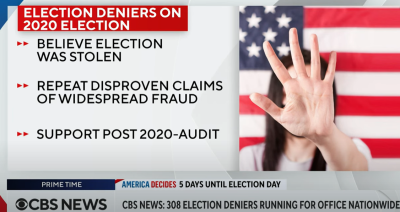4 times Democrats denied election results

Amid warnings of Republican “election deniers” prevailing in the upcoming 2022 midterm elections that will determine the control of Congress for the next two years, recent history shows that several Democrats have also claimed that elections were stolen or hacked.
With just days to go until the midterm elections, much talk has focused on election deniers, a derogatory term frequently used by the corporate press and some Democrats to refer to people who have raised questions about the results of the 2020 presidential election between President Joe Biden and former President Donald Trump. Media figures and Democrats have presented election deniers as a unique threat to American democracy in light of the riots that broke out at the U.S. Capitol on Jan. 6, 2021, as Congress gathered in a joint session to certify the results of the 2020 presidential election.

CBS News identified 308 so-called election deniers on the ballot in Tuesday’s elections. The network classified an election denier as anyone who “won’t say Biden was legitimately elected,” “[believes the 2020 presidential] election was stolen,” “[repeats] disproven claims of fraud,” “signed onto [a] lawsuit to overturn the 2020 election,” “objected to certify electoral college results in [Arizona and Pennsylvania]” or “[supports a] post 2020-audit.”
According to CBS News, this includes 238 Republican candidates seeking election to the U.S. House of Representatives, 20 Republicans seeking election to the U.S. Senate and 20 Republicans running in gubernatorial races.
The Electoral Count Act allows members of Congress to offer “objections” to the certification of the electoral votes in a particular state when the joint session of Congress to certify the election results takes place on Jan. 6, two months after a presidential election.
Under the Electoral Count Act, “Every objection shall be made in writing, and shall state clearly and concisely, and without argument, the ground thereof, and shall be signed by at least one Senator and one member of the House of Representatives before the same shall be received.”
After an objection is raised, both chambers of Congress pause the counting of electoral votes and debate whether to reject the electoral votes of the state in question.
Following the 2020 presidential election, amid questions about the numerous changes made to state election laws during the coronavirus pandemic without approval by state Legislatures, Rep. Paul Gozar, R-Ariz., and Sen. Ted Cruz, R-Texas, objected to the certification of the electoral votes in Texas.
Following a debate, 121 House Republicans and six Senate Republicans voted to object to the electoral college votes in Arizona. Those numbers did not produce enough support to successfully reject the electoral votes. Of the 121 House Republicans who voted to object to the electoral votes in Arizona, all but 17 are seeking reelection, and two are Republican nominees for U.S. Senate seats. Only one of the six Senate Republicans who objected to the electoral votes in Arizona, Sen. John Kennedy of Louisiana, is on the ballot this year.
Additionally, Rep. Scott Perry, R-Pa., and Sen. Josh Hawley, R-Mo., raised objections to the certification of electoral votes in Pennsylvania. This effort picked up the support of 138 House Republicans and seven Senate Republicans, once again coming up short. There was much overlap between the lists of members who objected to the Arizona and Pennsylvania results, with all but 18 House members running for reelection and none of the senators who objected to the Pennsylvania results appearing on the ballot this year.
Outrage over the riot at the Capitol led to a second impeachment against Trump, whose critics saw his raising questions about the validity of the results of the 2020 election as the instigation that led to the chaos that day.
As a lawyer defending the then-president pointed out during impeachment proceedings, Democrats have raised questions about the results of numerous elections that they did not win over the years and engaging in similar actions that have led to some of their Republican colleagues being called election deniers.
Here are four times when Democrats raised questions about the authenticity of election results.
Ryan Foley is a reporter for The Christian Post. He can be reached at: ryan.foley@christianpost.com



























